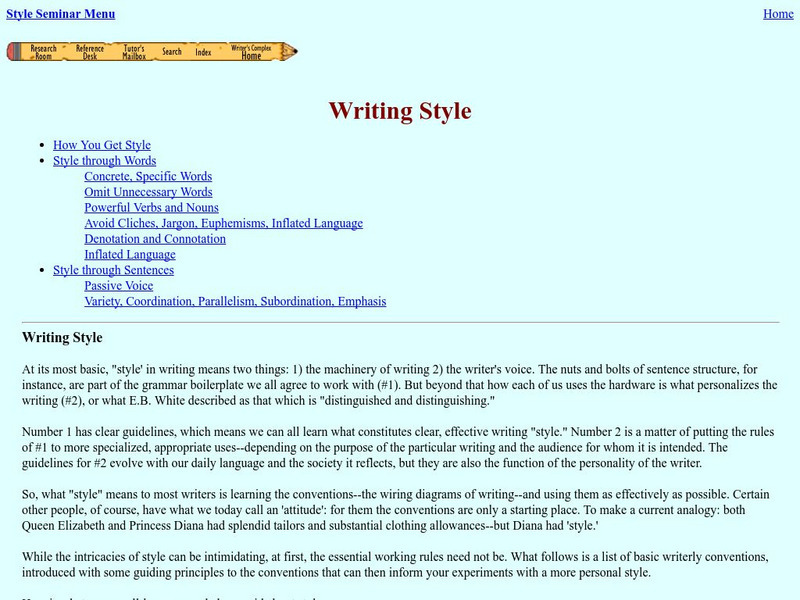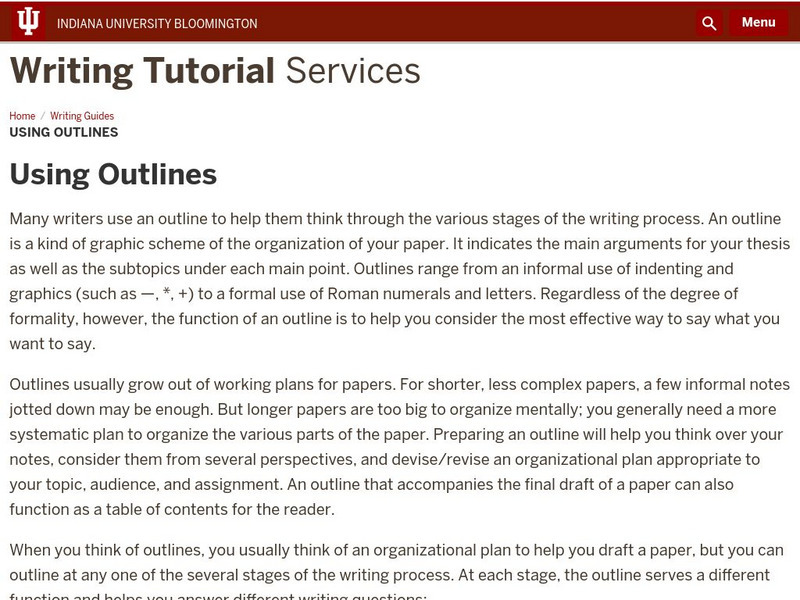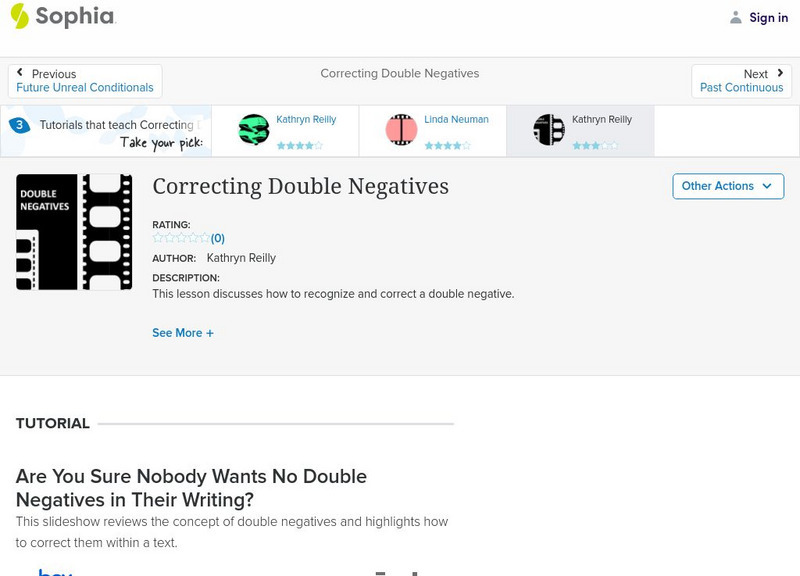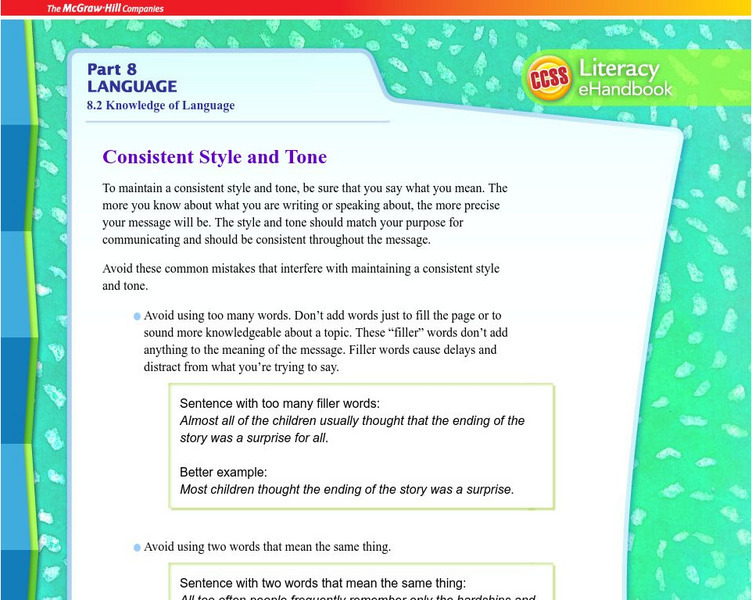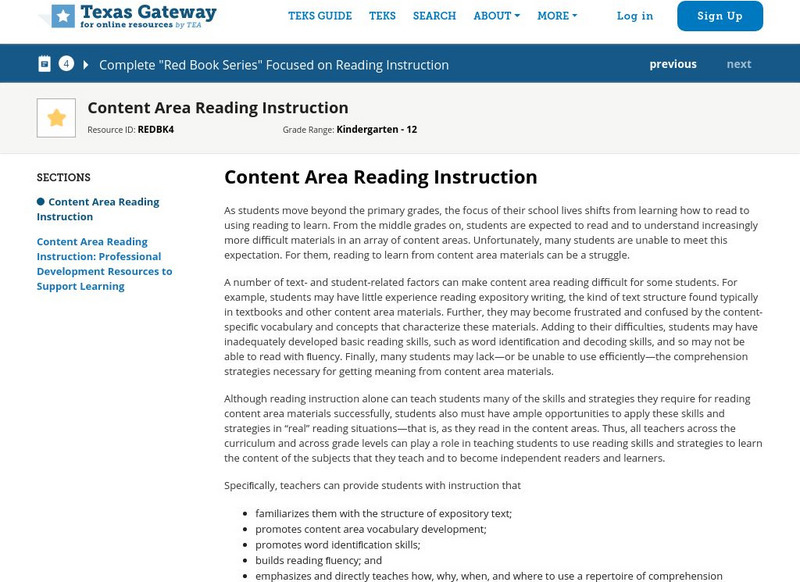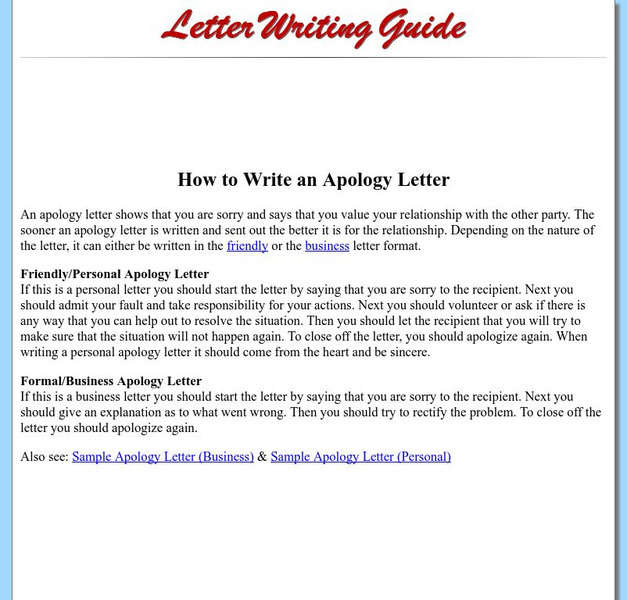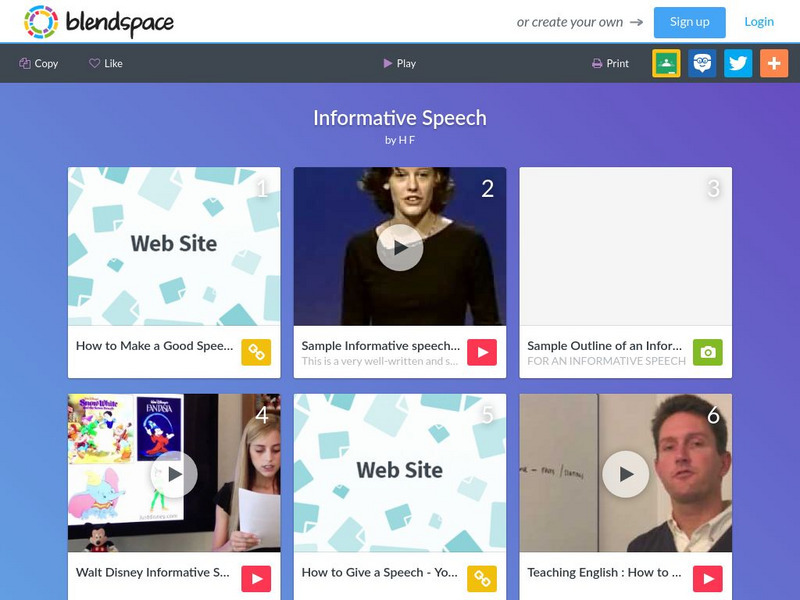Hi, what do you want to do?
Grammarly
Grammarly Blog: Anymore vs. Any More
This page explains the use of "anymore" in informal writing, but in formal writing and anywhere else, "any more" is preferable. Examples are provided.
Grammarly
Grammarly Handbook: Cliches
This page focuse on cliches and explains why they should not be used in formal writing; it provides examples of other words to get the point across more clearly.
ClassFlow
Class Flow: Formal Language
[Free Registration/Login Required] This flipchart can be used to understand features of formal official language through, collecting and analyzing examples, discussing when, why they are used; and noting the conventions of the language,...
Khan Academy
Khan Academy: Style and Technique
Use context to figure out how to use language appropriately--formality, irony, understatement, and overstatement.
SUNY Empire State College
Empire State College: Writing Style Seminar
This detailed resource provides a good tutorial on writing style, whether informal or formal. It explains how to get style through word and sentence choice and includes lots of examples. W.9-10.1d & W.9-10.2e Style/tone/conv,...
Grammarly
Grammarly Blog: Consistent Point of View
This Grammarly Handbook resource reminds students how to write with a consistent point of view. Examples are provided to demonstrate how to fix a sentence that contains an inconsistent point of view.
TES Global
Tes: Non Fiction Unit 4 Formal/impersonal Writing: Tourists
[Free Registration/Login Required] Students will analyze tourism brochures to determine features related to nonfiction writing in this unit. Tourism websites may be used in lieu of the brochures. Cotswold and the North Leigh Roman Villa...
Sophia Learning
Sophia: Appropriate Language
This lesson focuses on using appropriate language in formal writing; it discusses pretentious language, jargon, and cliches. It defines each, provides examples, and explains why and how to avoid each. SL.9-10.6 Adapt to task/formal
Indiana University
Indiana University: Writing Guides: Using Outlines
Explains how outlines can be used at different stages in the writing project. Covers outlines developed during research, prewriting, and drafting. Also discusses the formal outline, which may be required with a finished paper. Gives...
Sophia Learning
Sophia: Correcting Double Negatives
This slideshow lesson focuses on double negatives. It includes defining the term, explaining why they aren't used, providing a list of "no" words, offering ways to correct them with examples, and listing steps to eliminate them in writing.
Sophia Learning
Sophia: Correcting Double Negatives
This slideshow lesson focuses on fixing double negatives. It starts by showing what a double negative really says and how to make it say what they mean. It discusses why they are not used, when they can be used in writing, a list of...
Online Writing Lab at Purdue University
Purdue University Owl: Using Appropriate Language
Knowing the right language for your particular audience is a necessary skill for all writers. No one wants to offend their audience or appear as though they don't know their content. Learn these rules of thumb to become more familiar...
BBC
Bbc Bitesize Revision: Discursive (Analytical) Writing
Short tutorial about discursive, or analytical, writing from a Scottish Standard Grade examination preparation site. Contains seven pages of information about the following: organising, essay examples, finding information, planning,...
National Health Museum
Access Excellence: Writing Hypotheses
This informative page describes the true purposes of the hypothesis and how it should be used. Not only shows how they are written, but also helps students figure out the dependent versus independent variable.
Curated OER
Macmillan/mc Graw Hill: Writing: Consistent Style and Tone
Learn about maintaining a consistent style and tone in writing.
Capital Community College Foundation
Guide to Grammar and Writing: Tone: A Matter of Attitude
This site focuses on tone and audience with examples.
Texas Education Agency
Texas Gateway: Reading Instruction: Content Area Reading Instruction
This website offers a free download of the Research-Based Content Area Reading Instruction booklet. The purpose of this booklet is to provide teachers with research-based and classroom-tested information about each of these aspects of...
ReadWriteThink
Read Write Think: Lesson Plan: Audience, Purpose, Language in Electronic Messages
Lesson plan considers changes in writing style since the inception of e-mail and text messaging.
Letter Writing Guide
How to Write an Apology Letter
This informational site for teachers and students explains the importance of a letter of apology. Then the article articulates the types of information to include in friendly/personal apology letters and in formal/business apology letters.
BBC
Bbc Bitesize Revision: A Letter
Short tutorial about letter writing from a Scottish Standard Grade examination preparation site. Contains a page of information about personal letters and another about formal letters. This is followed by a five question interactive true...
Grammarly
Grammarly Blog: Capitalization:titles of Books, Articles, Songs
This page explains the rules for capitalizing titles: In informal writing all words may be capitalized, but in formal writing, articles, conjunctions, and prepositions are NOT capitalized unless they begin a sentence. Examples are provided.
TES Global
Blendspace: Informative Speech
A nine-part learning module with links to websites, videos, and images to use while learning how to write and deliver an informative speech.
New Zealand Ministry of Education
Nz Ministry of Education: Listen Up! Speak Up!
In this instructional activity students are given provided many opportunities to practice both informal and formal speaking skills. They begin with informal speaking in pairs, then groups of 4, etc. Then they write several drafts of a...
Cambridge Rindge & Latin School
Cambridge Rindge & Latin School: Making an Outline
A tip sheet on how to create and outline for a research paper.









